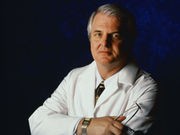

Compared to their international peers, doctors on the front lines of U.S. medicine feel they aren’t prepared to treat the sickest patients, a new survey finds.
Nearly one in four U.S. primary care doctors said their practices aren’t well-prepared to care for patients with complex medical needs. In both Germany and the Netherlands, just 12 percent of primary care doctors reported that their practices weren’t well-prepared.
The United States has the highest incidence of chronic disease in the 10-nation survey. Yet, on many measures of care management, the United States ranks in the middle or bottom of the pack.
“We need a strong primary care infrastructure and we don’t have it, and we haven’t had it for a long time, and it’s actually getting worse,” said Dr. David Blumenthal, president of The Commonwealth Fund.
The survey was published in the December issue of Health Affairs.
In many countries with strong primary care systems, doctors act as gatekeepers, and nurses and care managers help manage complex patients, explained study lead author Robin Osborn, a vice president at The Commonwealth Fund.
Study co-author Eric Schneider, senior vice president of The Commonwealth Fund, said better primary care requires better teamwork.
The new survey culled data from more than 11,000 primary care physicians in Australia, Canada, Germany, the Netherlands, New Zealand, Norway, Sweden, Switzerland, the United Kingdom and the United States.
In the United States, primary care doctors include general and family physicians, internists and pediatricians.
The report exposed gaps in care coordination, communication, access to care and use of information technology across the 10 industrialized nations.
Only one in three U.S. doctors says he or she is always notified when a patient is discharged from the hospital or seen in the emergency department. The Netherlands leads all nations on those measures, with two in three doctors saying they hear from the hospital or emergency department.
In the Netherlands and Great Britain, more than 80 percent of doctors frequently make home care visits; in the United States, only 6 percent do so.
In nine of the 10 surveyed countries, doctors said they feel least prepared to manage severe mental health and substance abuse problems. Confidence levels are lowest in the United States and Sweden, with fewer than one in six saying they are well-prepared.
“We really operate in different silos,” said Dr. Nitin Damle, a private practice physician in Wakefield, R.I., and president of the American College of Physicians. “We have the behavioral health system and we have the medical system and, really, the two don’t communicate that well,” he said.
The survey points out other shortfalls and barriers to better patient care:
- Fewer than half of U.S. doctors feel prepared to manage patients with dementia (47 percent), those needing palliative care (41 percent) and people needing home care (46 percent).
- Only 39 percent of U.S. primary care doctors said their practices arrange for patients to see a doctor or nurse after hours without having to visit the emergency department, and that was the lowest percentage among the 10 countries surveyed.
- More than half of U.S. doctors said time spent on insurance issues is a major problem, a feeling shared by their colleagues in Germany, the Netherlands and Switzerland — all countries that have multi-payer private insurance systems.
- Primary care doctors in the United States are least likely to feel the health care system works well, needing only minor changes. Only 16 percent agreed with that statement.
There were a few bright spots in the survey. Having made major strides in the adoption of electronic medical records in recent years, 57 percent of U.S. primary care doctors said patients can communicate with them by e-mail. Sixty percent — substantially more than in any other country — said patients can access their medical records electronically.
The study authors called for continued experimentation with new care delivery and payment models.
Damle, who is also a clinical assistant professor of medicine at Brown University’s Alpert School of Medicine in Providence, said assembling teams of providers to manage chronic-care patients requires a lot of money.
“That’s a major stumbling block to any of this really happening,” he said. “We need to be adequately reimbursed to provide these services.”
More information
The Commonwealth Fund report shows how primary care in the U.S. stacks up against other nations .
Source: HealthDay
Copyright © 2025 HealthDay. All rights reserved.

Leave a Reply